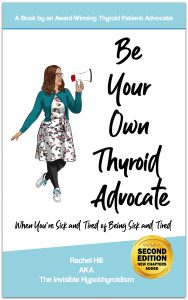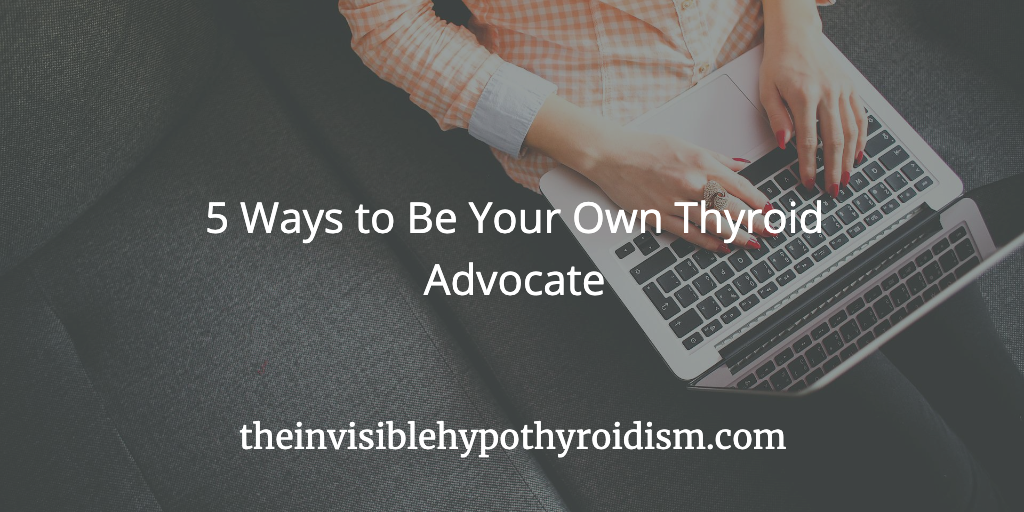A lot of people are confused by what it means to be your own thyroid advocate.
Since the whole message of my work, website articles, books and more is to be your own thyroid advocate I definitely needed a post explaining exactly what this means!
What Does ‘Be Your Own thyroid Advocate’ Mean?
Being a thyroid patient isn’t easy. Conditions such as hypothyroidism (also known as an underactive thyroid) and Hashimoto’s are often perceived to be ‘easy to treat’ conditions and ones that do not affect someone’s quality of life. This couldn’t be more wrong.
Many people around the world are diagnosed with these conditions, started on medication yet feel no better months or even years later.
Trips back and forth to the doctor, complaining of ongoing symptoms (and perhaps even new ones) just to be told that our thyroid levels are ‘fine’ and there is nothing more that can be done.
This is where it helps to learn how to advocate for yourself and your thyroid health.
We do not have to continue living poor quality lives, however, a lot of the improvements unfortunately need to be driven by the patient. This will require some of your time, dedication and energy as you figure out how to navigate becoming an active participant in your healthcare (instead of a passive one).
What does this look like?
1. Learn Which Tests You Need
Getting the right tests run with hypothyroidism is crucial. Testing the full thyroid panel (or ‘thyroid function test’ as it is sometimes known), gives the full, comprehensive view of your thyroid health, how treatment is working and how management could perhaps be improved.
The full thyroid panel consists of:
- TSH
- Free T3
- Free T4
- Thyroid peroxidase antibodies
- Thyroglobulin antibodies
Not having these tested may mean that you are missing a very useful part of your treatment and management puzzle and therefore, may not be getting the best treatment for you.
Many thyroid patients find that they need a different dosage and/or type of thyroid medication, upon having all of these tests ran, whereas a TSH test alone would not pick up on this.
Have you also checked if you have the autoimmune disease Hashimoto’s Thyroiditis by having your thyroid antibody levels tested?
It’s good to know if you have Hashimoto’s because if you do, there are things you can do to lower the antibodies, and keeping antibodies low is important if you want to stop any further damage being done to your thyroid gland. Getting my antibodies low and Hashimoto’s in to remission was key in helping me to manage my thyroid condition and feel better long term.
It’s worth knowing that you can order full thyroid panels yourself from online laboratories too. Find a UK lab here and a US lab here.
Other tests worth exploring initially include:
Iron, T.I.B.C., Transferrin Saturation
2. Learn How To Understand Your Test Results
Step 1: Obtain a printed copy of your test results (the receptionist cannot say no).
Step 2: Learn how to read these.
Test results should be provided with the ‘acceptable ranges’ stated next to them, usually within brackets. This may look like:
Thyroid Stimulating Hormone (TSH): 2.71mu/L [0.9 – 4.21]
Those brackets provide the usual reference range and most often, conventional doctors will be content as long as you fall within that range. However, more progressive practitioners promote a more narrow and specific range, stating that ranges like the one given above are often too wide, outdated and not optimal.
You’ll find that many thyroid advocacies and progressive medical practitioners agree that when testing a thyroid panel, a TSH less than 2 or 2.5, and a Free T3 in the top quarter of the range, with a Free T4 mid-range or a little higher is considered optimal. Thyroid antibodies as low as possible are also seen as optimal as this signals Hashimoto’s being more under control or ‘in remission’.
These optimal levels mean that a lot of thyroid patients say they feel most well when their TSH is 2.5 or below, for example. Or their Free T3 is at 17.5 or above on a scale of 10-20.
For you, you may feel best somewhere else within range, but you should try to find out and maintain it at what you feel best at. This is the definition of optimising your thyroid treatment.
Since a lot of us didn’t have our thyroid levels tested before we developed a thyroid condition and began to feel unwell, we often don’t know what our levels were when we felt well. So you must work to find where your own individual optimal levels are.
More information including references are shown here.
3. Learn Which Changes You Can Make To Improve Your Health
It’s not all about thyroid medication; there are many other parts of our bodies and lifestyles that can impact thyroid health and vice versa.
For example, have you considered how your diet can impact the management of your thyroid disease? The type, frequency and intensity of any exercise you do? Your stress levels and whether you effectively manage this? Vitamin levels such as iron, Vitamin D and B12?
The list is exhaustive. I have always said that improving our health with thyroid disease is like piecing together a big thyroid jigsaw puzzle.
It took several years and a lot of trial and error, various interventions and lessons learned for me to regain my quality of life.

You can also find more guided support in my book Be Your Own
4. Find The Right Medical Professional For You
As a thyroid patient, there are different types of medical and healthcare professionals you may wish to see for your treatment and management of your thyroid condition.
Some can be more useful in addressing different areas of the condition than others and different patients find different success with different types of doctors.
Whether it’s a GP, endocrinologist, functional medicine doctor or naturopath, finding the right medical professional for your situation and needs is crucial. As well as being your own health advocate, it helps hugely to have a medical professional guide you, offer support and take some of the burden of managing a health condition too.
Read about the different types of practitioner here.
5. Become More Confident in Navigating Appointments
By feeling more confident about navigating doctor appointments, you can get further and achieve better results in terms of improving your health.
You can do this by:
- Planning head: write down questions, symptoms and what you want to ask ahead of the appointment and take your note with you. Print off references to research.
- Paying attention to body language: remain calm yet assertive. Practice with a friend if it helps.
- Considering outcomes: and preparing for things to not go exactly as planned.
More in depth guidance can be found here.
Conclusion
I’ve made it no secret that the reason I was able to go from barely functioning thanks to hypothyroidism, to finally getting my health back on track again and resuming a normal quality of life, is because I took ‘be your own thyroid advocate’ literally.
I had to learn to be my own advocate when it came to my health, because being passive in my own healthcare meant I stayed unwell.
My main message to thyroid patients will always be to advocate for yourself and push for better health and quality of life.







